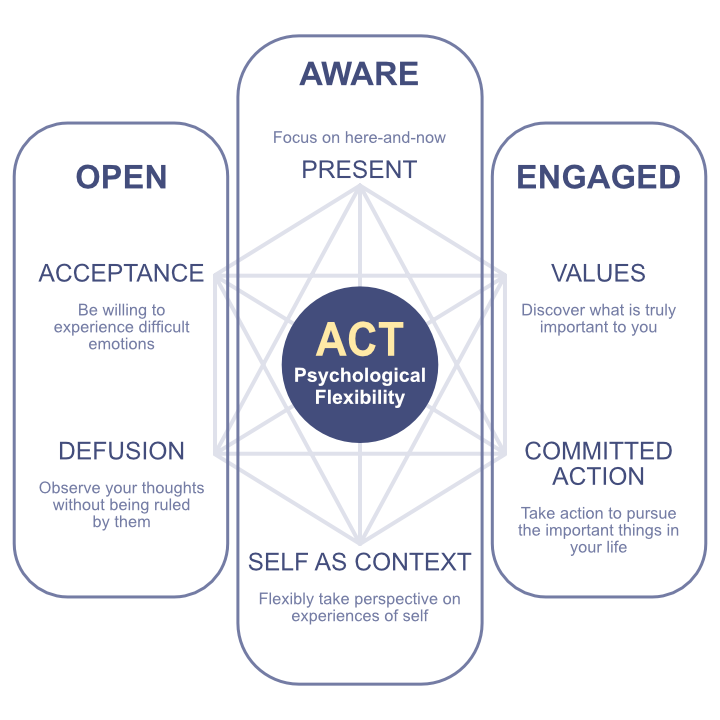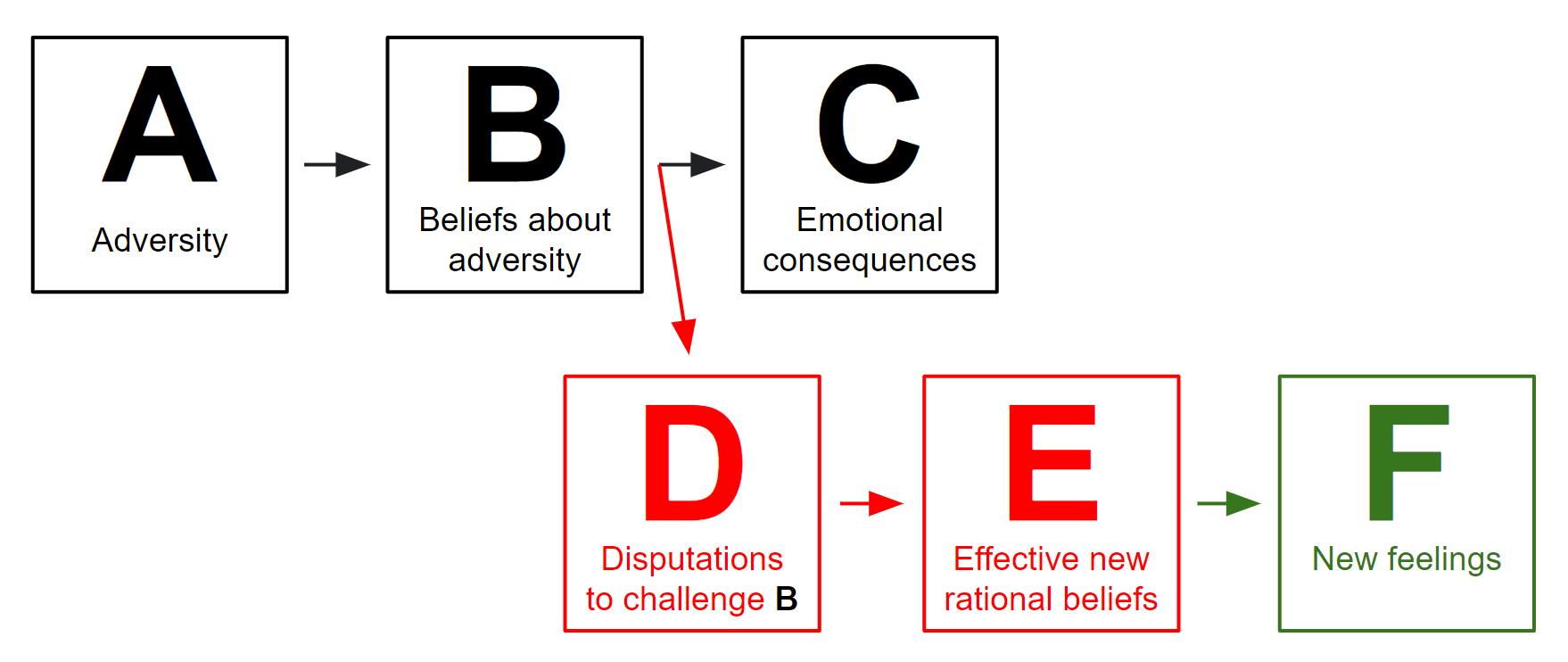The Ultimate List of Counseling Theories, Lens, & Treatments
269+ Counseling Theories, Frameworks, & Treatments
It’s not always easy to know what you should look for in a therapist or what type of therapy you need. With all the different theories, acronyms, and psychobabble out there, I was curious as to how many different therapies were actually out there. I was unable to find any comprehensive list of counseling therapies, so I made this one.
View the Google Sheet version of the list for additional details (e.g., key people, terms, etc.).
The Theory List
Accelerated Experiential Dynamic Psychotherapy (AEDP): Emphasizes the healing power of emotions. It is an experiential and attachment-based therapy that aims to create a secure and supportive environment where clients can explore and process emotions safely. AEDP seeks to help clients achieve personal growth and transformation by promoting emotional awareness, regulation, and integration.
Accelerated Resolution Therapy (ART): Uses a combination of techniques, including eye movements and visualization, to treat traumatic stress and related conditions. The goal of ART is to help clients process traumatic memories and associated emotions quickly and effectively. ART is a relatively new therapy.
Acceptance and Commitment Therapy (ACT): Aims to help clients develop psychological flexibility by accepting difficult thoughts and emotions while committing to positive behavior change. ACT emphasizes the importance of living in the present moment and engaging in values-based actions that align with one's goals and aspirations. ACT uses a variety of techniques, such as mindfulness, acceptance, and values clarification, to help clients build flexibility and achieve a more fulfilling life.

Adlerian Therapy: A goal-oriented therapy that emphasizes the importance of client's unique experiences and perspective. It is based on the work of Alfred Adler, who believed that humans have an innate desire to belong and strive for success.
Affect Regulation: The practice of regulating and managing one's emotions in a healthy way, often through techniques such as mindfulness and deep breathing exercises.
Analytical Psychology: A therapeutic approach based on the ideas of Carl Jung. It emphasizes the exploration and integration of unconscious thoughts and emotions to achieve psychological wholeness and personal growth. Analytical Psychology also emphasizes the importance of spirituality, creativity, and the collective unconscious in the human psyche.
Applied Behavioral Analysis (ABA): An approach that aims to modify behavior by applying principles of learning theory. It is most commonly used to treat autism spectrum disorder and other developmental disabilities, but can also be used to address a variety of other behavioral issues. ABA uses a structured, data-driven approach to identify target behaviors and reinforce positive behavior through rewards and consequences.
Attachment Theory: A psychological theory that explains how humans form emotional bonds with others, particularly in early childhood. It was first proposed by John Bowlby, who emphasized the importance of secure attachment in forming healthy social and emotional relationships throughout life. Attachment theory suggests that early attachment experiences can impact an person's emotional regulation, sense of self, and ability to form close relationships.
Attack Therapy: A highly controversial form of therapy that involves using aggressive and confrontational techniques to help clients overcome emotional issues. This approach has been criticized for potentially causing harm to clients.
Attitude Therapy: A form of cognitive-behavioral therapy that focuses on changing attitudes and beliefs to improve emotional well-being.
Behavior Therapy: Focuses on modifying and changing problematic behaviors through techniques such as reinforcement, punishment, and modeling. It is based on the principles of behaviorism and emphasizes the role of the environment in shaping behavior. Behavior therapy is often used to treat a range of psychological disorders, such as anxiety, depression, and phobias. Behavior therapy was a significant development in the history of modern psychology. It helped to shift the field's focus from subjective experiences to objective behaviors that could be observed and measured.
Behavioral Activation: A type of behavioral therapy that aims to alleviate symptoms of depression by increasing engagement in positive and rewarding activities. It is based on the idea that depression often leads to a reduction in activities and social interactions, which in turn reinforces negative thoughts and feelings. Behavioral Activation encourages people to participate in enjoyable and meaningful activities, even if they do not feel like doing so at first, with the goal of increasing positive experiences and reducing depression symptoms.
Bibliotherapy: The use of literature and other written materials as a therapeutic tool to help clients explore and process their emotions and experiences.

Bifocal Therapy: A psychotherapeutic approach that involves working with both the client and their family to address emotional and behavioral issues.
Biofeedback: Technique that teaches people how to control their body's responses to stress and anxiety. It uses electronic monitoring devices to measure bodily functions such as heart rate, muscle tension, and brain waves. Patients learn techniques to control these functions, which can help reduce symptoms of anxiety, headaches, and other physical and mental health issues.
Body Psychotherapy: A type of therapy that combines talk therapy with body-based techniques such as breathing exercises and movement in order to promote emotional healing and well-being.
Bowen Family Systems Therapy: A therapy that focuses on understanding and addressing the underlying patterns and dynamics within a family system, with the goal of improving individual functioning and relationships. It emphasizes the importance of differentiation, or the ability to balance emotional closeness with individual autonomy, as a key factor in achieving healthy family relationships.
Brainspotting: A therapeutic approach that focuses on identifying and processing trauma and other emotional issues through the use of eye positions. It is based on the hypothesis that certain eye positions can activate corresponding areas in the brain where traumatic memories may be stored (i.e., "brainspots"), allowing for the release and processing of unresolved emotional experiences.
Brief Solution-Focused Therapy: A type of psychotherapy that focuses on identifying and achieving specific, measurable goals in a short period of time, typically 8-12 sessions or less. It emphasizes the client's strengths and resources, and encourages them to develop solutions to their problems through a collaborative and goal-oriented approach. The therapist asks questions that are designed to client focus on their desired outcome, and to identify any strengths and resources that they can draw upon to achieve it.
Career Counseling: A process in which a trained professional helps clients identify their career goals and develop a plan to achieve them. The counselor will typically use a variety of assessment tools, including personality tests and interest inventories, to help the client gain insight into their strengths, interests, and values. The counseling process may also involve exploring potential career paths, developing job search strategies, and providing support and guidance throughout the job search process.
Chairwork: An intervention that involves role-playing conversations with different parts of oneself (or important people in your life). It is typically done while sitting in chairs facing each other, with the therapist guiding the conversation between the patient's different selves. It is often used to help people work through difficult emotions, relationships, and traumas.
Character-Analytic Vegetotherapy: A psychotherapeutic approach that focuses on the relationship between the body and mind to promote emotional healing and personal growth.
Choice Theory/Reality Therapy: A therapeutic approach emphasizing personal responsibility and focuses on the present rather than the past. The therapy is based on the belief that people can learn to make more effective choices and improve their lives by taking responsibility for their own behavior and making choices that are in line with their own values and goals. The therapist works collaboratively with the client to identify and address any discrepancies between the client's behavior and their goals, and to develop a plan for making positive changes.
Christian Counseling: Integrates Christian principles and beliefs into the counseling process. It can be used to help clients who are struggling with spiritual issues, relationship problems, or other mental health concerns.
Cinema Therapy: A form of therapy that involves using films and movies to help clients gain insight into their emotions, experiences, and relationships.

Client-Centered / Person-Centered Therapy: A form of therapy that emphasizes the importance of creating a safe and supportive environment for the client. The therapist provides the client with unconditional positive regard, meaning that they accept and respect the client without judgment or conditions. This allows the client to feel heard and understood, which can lead to increased self-awareness and self-acceptance.
Co-Counseling: A peer-to-peep approach that involves two people taking turns being the counselor and the client, with the aim of promoting mutual emotional support and growth.
Coaching: A process where a coach helps clients clarify their goals, identify obstacles, and develop strategies to achieve success in a specific area of their life, such as career, relationships, or personal growth.
Cognitive Behavioral Therapy (CBT): A type of psychotherapy that focuses on changing negative thought patterns and behaviors that contribute to mental health problems. The therapy is based on the idea that thoughts, feelings, and behaviors are interconnected and that changing one can positively impact the others. The therapist works collaboratively with the client to identify negative thoughts and behaviors, and then teaches them strategies to challenge and change them. Interventions include cognitive restructuring, exposure therapy, relaxation techniques, and thought records, among others.
Cognitive Processing Therapy (CPT): A type of therapy that is often used to treat post-traumatic stress disorder (PTSD). It involves a structured approach to identifying and changing negative thoughts and beliefs related to the traumatic event, with the goal of reducing symptoms such as anxiety, flashbacks, and avoidance behaviors.
Cognitive Therapy: A therapeutic approach that focuses on identifying and changing negative or distorted thinking patterns that contribute to emotional and behavioral difficulties, such as depression or anxiety. The therapist works collaboratively with the client to challenge and modify these unhelpful thoughts, and to develop more accurate and adaptive ways of thinking.
Cognitive-Behavioral Analysis System of Psychotherapy (CBASP): A type of therapy that combines cognitive-behavioral techniques with the analysis of interpersonal dynamics in order to promote positive change. Specifically designed to treat persistent depression.
Coherence Therapy: A therapeutic approach that seeks to identify and change negative core beliefs in order to promote emotional healing and well-being.
Collaborative Problem Solving: A collaborative approach to problem-solving that emphasizes the importance of active listening, empathy, and mutual respect.
Collaborative Therapy: A therapeutic approach that emphasizes the importance of collaboration and shared decision-making between therapist and client.
Compassion-Focused Therapy (CFT): A type of therapy that focuses on cultivating feelings of warmth, care, and understanding towards oneself and others. It emphasizes the importance of developing a compassionate attitude towards one's own struggles and difficulties, as well as towards the difficulties of others. This approach can help client's overcome feelings of shame, self-criticism, and anxiety, and instead foster a sense of self-acceptance, resilience, and empathy.
Compassionate Inquiry: A therapeutic approach that encourages clients to explore their emotions and experiences in a safe, supportive environment in order to promote personal growth and self-awareness.
Connection Theory: A theoretical framework that emphasizes the importance of contemplation and mindfulness in promoting emotional healing and well-being.
Constructivist Psychotherapy: A therapeutic approach that focuses on understanding and addressing the wider social and cultural contexts in which clients and families exist. More of a theory of knowledge than a system of therapy.
Contemplative Psychotherapy: A therapeutic approach that emphasizes the importance of identifying and overcoming unconscious beliefs and behaviors that may be hindering personal growth and well-being.
Contextual Therapy: A family therapy that emphasizes the interconnectedness of family members and their past and present relationships. It focuses on promoting justice and fairness in relationships, while also addressing the impact of past events on current family dynamics. Aims to help family members understand and heal from the effects of past trauma and to develop healthier communication and interaction patterns.
Control Mastery Theory: A counseling theory focused on the belief that people have an innate drive to master and control their environment and that control is crucial to psychological health.
Conversational Model: A therapeutic approach that emphasizes the importance of language and conversation in the counseling process and seeks to help clients create new narratives to change their lives.
Conversion Therapy: A controversial approach, deemed unethical by many mental health associations, aimed at changing a person's sexual orientation or gender identity through therapy and other interventions.
Core Energetics: A somatic therapy that combines talk therapy with physical exercises to help clients access and release emotions and tensions stored in the body.
Creative Arts Therapy: A type of therapy that incorporates creative and artistic expression into the therapeutic process to help clients explore and express their emotions.
Creative Imagination: A therapy that encourages the use of imagination to access emotions, memories, and insights.
Critical Incident Stress Debriefing: An intervention designed to support people who have experienced a traumatic event. It involves a structured debriefing process, led by a trained professional, aimed at processing the traumatic event and promoting resilience. However, there is controversy over the effectiveness of CISD, and some research suggests it may not be effective for everyone and could potentially cause harm in certain cases.

Dance Movement Therapy: A therapy that uses dance and movement to explore emotions, improve self-esteem, and promote physical and emotional healing.
Daseinsanalysis: A psychoanalytic approach that focuses on understanding the unique ways in which people experience their existence and seeks to help clients create meaning and purpose in their lives.
Discernment Counseling: Counseling designed to help couples who are considering divorce to make a decision about the future of their relationship. It typically involves a brief intervention that focuses on exploring the underlying reasons for the couple's uncertainty and helping them clarify their goals and priorities.
Depth Psychology: A therapy that emphasizes the unconscious aspects of the psyche and focuses on exploring and resolving deep-seated emotional conflicts.
Developmental Counseling and Therapy (DCT): A humanistic counseling theory that emphasizes the importance of meeting an client's developmental needs at every stage of life.
Developmental Needs Meeting Strategy (DNMS): A ego state therapy that seeks to help clients overcome developmental trauma by meeting unmet needs and providing opportunities for growth.
Developmental Psychology: The scientific study of human development across the lifespan.
Dialectical Behavior Therapy (DBT): A therapy that combines cognitive-behavioral techniques with mindfulness practices to help clients regulate their emotions and improve their relationships with others.
Drama Therapy: A therapy that uses drama and theater techniques to explore emotions and improve communication skills.
Dream Analysis: A therapy that focuses on exploring the meaning and symbolism of dreams to gain insight into the unconscious mind.
Dyadic Developmental Psychotherapy: A form of therapy that focuses on repairing attachment disruptions and promoting healthy attachment relationships between parents and children.
Dynamic Interpersonal Therapy: Focuses on helping clients develop more adaptive patterns of relating to others. It is based on the idea that problematic interpersonal patterns are often rooted in early life experiences, and that addressing these patterns can lead to more positive outcomes in the present.
Eclectic Therapy: A therapy that integrates techniques from various counseling theories to create a personalized treatment plan for each client.
Ecological Systems Theory: A theory that emphasizes the importance of understanding the complex systems in which clients exist and how these systems impact their mental health.
Ecotherapy: Type of therapy that encourages clients to connect with nature as a way of improving their mental and emotional wellbeing. It involves activities such as gardening, hiking, and animal-assisted therapy, and aims to promote a sense of connection with the natural world.

Emotional Freedom Techniques (EFT): A technique that involves tapping on specific points on the body to reduce anxiety and other negative emotions.
Emotionally Focused Therapy: A therapy that seeks to help clients access and work through emotions that have been previously ignored or avoided. There are subsets of Emotionally Focused Family Therapy (EFFT), and Emotionally Focused Individual Therapy (EFIT).
Emotional Transformation Therapy: A form of psychotherapy that claims to use precise visual light stimulation and interpersonal processes to rapidly alter emotional states and alleviate psychological distress. Based on the assumption that light and eye movement can access and transform neural-emotional patterns, it merges elements of neuroscience, attachment theory, and somatic experience. It's empirical support remains limited and warrants critical scrutiny.
Encounter Groups Therapy: A group therapy approach that involves bringing clients with different backgrounds and perspectives together to promote personal growth and emotional healing. Frequently provided by unlicensed facilitators.
Energy Psychology: Combines traditional psychotherapy with techniques that focus on the body's energy systems (like acupuncture points or meridians). It proposes that emotional and psychological issues are linked to disruptions in these energy flows. By addressing these disruptions, energy psychology aims to improve mental health and well-being.
Equine Assisted Psychotherapy: A form of therapy that involves interacting with horses to improve emotional well-being and personal growth.
Existential Therapy: A form of psychotherapy focusing the on client's experience of existence and the meaning and purpose of life. It is based on the philosophy of existentialism, which emphasizes the importance of free will, choice, and personal responsibility in shaping one's life. The therapist works collaboratively with the client to explore their unique perspective on life, their values and beliefs, and their experience of freedom and choice. The goal is to help the client develop greater self-awareness, acceptance, and personal growth, and to live more authentically and purposefully.
Existential-Humanistic Therapy: A therapy that combines existential philosophy with humanistic psychology and focuses on helping clients achieve self-actualization.
Experiential Family Therapy: A family therapy that emphasizes the importance of experiential learning and focuses on the emotional experiences of family members.
Experiential Therapy: Emphasizes the importance of experiencing emotions in the here and now and seeks to help clients overcome emotional blocks by providing new experiences. May also refer to a class of psychotherapies.
Exposure Therapy (and response prevention): Behavioral treatment that helps patients confront and reduce fear or anxiety by gradually facing feared objects, situations, or memories in a controlled and systematic way. Over time, repeated exposure leads to desensitization, violation of fears/expected outcomes, and reduces avoidance behaviors. Front-line treatment for OCD.
Expressive Arts Therapy: A form of therapy that integrates various artistic modalities, such as dance, music, painting, and writing, to help clients express and explore their emotions, thoughts, and experiences.
Eye Movement Desensitization and Reprocessing (EMDR): A therapeutic approach that uses rapid eye movements to help clients process traumatic experiences and alleviate associated symptoms.
Facilitated Communication: A technique that was used intending to assist people with communication difficulties to express themselves by typing on a keyboard, while being physically guided or supported by another person. However, this method is controversial, potentially harmful, and has been found to lack scientific validity.
Family Constellations: An approach that involves exploring family dynamics and patterns across generations to identify and resolve issues.
Feldenkrais Method: A body-centered approach that focuses on improving physical movement and function to promote emotional well-being and personal growth.
Feminist Multicultural Therapy: A therapeutic approach that considers how societal oppression and power dynamics impact clients, particularly those from marginalized groups, and seeks to empower and validate their experiences.
Feminist Relational Psychotherapy: A type of feminist therapy that focuses on the therapeutic relationship as a means of promoting empowerment, equality, and connection. See also Relational-Cultural Therapy.
Feminist Therapy: A therapeutic approach that is based on feminist principles and seeks to address societal and personal factors that contribute to clients' difficulties and empower them to make changes.
Fixed-Role Therapy: A psychotherapeutic approach that involves acting out different roles to help clients overcome emotional issues and improve interpersonal relationships.
Focal Psychodynamic Therapy: A type of psychodynamic therapy that focuses on a specific issue or symptom and explores its underlying unconscious dynamics.
Focus-Oriented Psychotherapy: A client-centered approach that helps clients access and explore their bodily felt experiences in order to gain insight, healing, and personal growth. See also Process-Experiential Therapy.
Functional Analytic Psychotherapy (FAP): A form of behavior therapy that focuses on developing a therapeutic relationship that promotes the client's growth and change.
Functional Family Therapy (FFT): A family therapy approach that seeks to improve communication and problem-solving skills in families, particularly those with adolescent children who are experiencing behavioral or emotional difficulties.
Gender Role Analysis: A therapeutic approach that explores the impact of societal gender norms and expectations on client's and their behavior.

Gender Therapy: Usually refers to an approach taken by a mental health professional that focuses on helping clients explore and navigate issues related to gender identity, gender incongruence, gender expression, and gender dysphoria. This can involve various approaches depending on the client's needs (e.g., working with parents or loved one's depending on age, managing experiences of discrimination or invalidating, or supporting clients if they seek gender-affirming medical interventions).
Gestalt Play Therapy: An experiential, child-centered approach to therapy that focuses on promoting self-awareness and personal growth through creative and expressive play activities.
Gestalt Therapy: A form of humanistic therapy that focuses on the client's experience in the present moment and emphasizes personal responsibility, awareness, and self-acceptance.
Good Lives Model: A therapeutic approach that focuses on individuals' values, goals, and aspirations and seeks to promote their overall well-being and happiness.
Gottman Method Couples Therapy: A therapeutic approach that focuses on improving communication, intimacy, and emotional connection in couples, based on research by John Gottman.
Grief Counseling: Perhaps less than a theory, and more of an approach. Helps clients cope with the loss of a loved one. May involve talking about the grieving process, exploring coping strategies, and developing a support network. It can be used to help clients work through feelings of sadness, guilt, anger, and other emotions associated with loss.
Group Analytic Psychotherapy: A group therapy approach that emphasizes exploring group dynamics and how they relate to clients' experiences and personal growth.
Group Therapy: A therapeutic approach that involves a group of clients who come together to share their experiences, support each other, and work towards personal growth and change.

Habit Reversal Training: An evidence-based approach to treat hair-pulling (trichotillomania), skin-picking (dermatillomania), other body-focused repetitive behaviors (BFRBs), and tics. It involves self-monitoring, awareness training, developing alternative behaviors, and social support.
Hakomi Method: A mindfulness-based therapy that combines techniques from Eastern spirituality and Western psychology to help clients explore their core beliefs and emotional patterns.
Harm Reduction Therapy: A harm reduction approach that seeks to minimize the negative consequences of substance use and other high-risk behaviors, without necessarily promoting abstinence.
Healing Touch: A type of energy therapy that involves gentle touch to support the healing of physical, emotional, mental, and spiritual imbalances.
Healing-Informed Practices: A therapeutic approach that acknowledges and addresses the impact of trauma on clients' physical, emotional, and spiritual health.
Heart-Centered Hypnotherapy: A hypnotherapy approach that focuses on accessing and healing the emotional wounds held in the heart.
Holding Therapy: A controversial therapy that involves holding and physical contact to promote attachment and healing, particularly in children with attachment difficulties.
Holistic Therapy: A therapy approach that considers the whole person, including physical, emotional, and spiritual aspects, to promote healing and well-being.
Human Givens Therapy: Aims to help people identify and meet their emotional needs and access their innate resources to overcome difficulties and find balance in life.'
Humanistic Psychology: A psychological perspective that emphasizes human potential and the importance of client agency and choice in personal growth and fulfillment.
Hypnotherapy: A type of therapy that uses hypnosis to access the subconscious mind and promote healing and personal growth.
Imago Relationship Therapy: A couples therapy approach that emphasizes empathic communication and mutual growth, based on the Imago Dialogue.
Inference-Based Therapy: Developed to treat obsessive-compulsive disorder, it aims to help clients recognize and challenge unhelpful assumptions and beliefs that may be contributing to their emotional distress and develop more adaptive thinking patterns. Critics argue that the emphasis on identifying and challenging beliefs may not be as effective as traditional exposure and response prevention (ERP) therapy.

Inner-Child Therapy: A type of therapy that focuses on healing childhood wounds and promoting emotional growth and development.
Integral Psychotherapy: A therapeutic approach that integrates various psychological theories and techniques to address the complexity of human experience.
Integrated Behavioral Health: A model of care that integrates mental and physical health care services to promote holistic well-being.
Integrative Behavioral Couple Therapy (IBCT): A couples therapy approach that combines behavioral strategies (e.g., problem-solving and communication skills training) and insight-oriented techniques to improve communication and intimacy.
Integrative Body Psychotherapy: A body-oriented therapy that emphasizes the connection between physical sensations, emotions, and beliefs to promote healing and growth.
Integrative Psychotherapy: A therapeutic approach that integrates various psychological theories and techniques to address the complexity of human experience.
Internal Family Systems Therapy (IFS): A type of therapy that focuses on healing the internal system of sub-personalities and promoting personal growth and self-awareness.
Interpersonal and Social Rhythm Therapy (IPSRT): A form of psychotherapy that combines techniques from interpersonal therapy and cognitive-behavioral therapy to help people with bipolar disorder stabilize their moods by regulating their daily routines and social relationships.
Interpersonal Hypnotherapy: A type of hypnotherapy that focuses on improving interpersonal relationships and communication.
Interpersonal Psychotherapy (IPT): A short-term therapy that focuses on resolving interpersonal problems and improving communication skills.
Interpersonal Reconstructive Therapy (IRT): A type of therapy that focuses on understanding and changing the ways clients relate to others, based on their past experiences and relationships.
Intersectional Framework: A framework that considers how various aspects of identity, such as race, gender, and class, intersect to shape clients' experiences and challenges.
Intersubjective Systems Theory (ISTDP): A view within the psychoanalytic tradition that human development is shaped by ongoing interactions with the social environment, emphasizing the importance of relationships and societal context.
Jungian Analysis: Uses symbolic imagery to explore unconscious patterns and conflicts.
Jungian Sandplay Therapy: Non-verbal therapy that uses a sandbox and figurines to express emotions and explore unconscious material.
Lifespan Integration Therapy: Aims to resolve emotional and developmental trauma by using a structured protocol to access and integrate early memories and experiences across the lifespan.
Logosynthesis: Focuses on resolving traumas by changing beliefs and perceptions through guided imagery and energy tapping.

Logotherapy: Focuses on finding meaning in life and taking responsibility for one's choices and actions.
Maudsley Family Therapy: A type of family-based treatment that is designed to help adolescents with eating disorders by involving the entire family in the treatment process and promoting a supportive and collaborative approach to recovery.
Metacognitive Therapy: Targets how we think about our thinking (metacognition). It identifies unhelpful thinking patterns, like rumination or worry, and teaches individuals how to change those patterns to reduce anxiety and depression.
Mentalism Based Treatments: A psychotherapeutic approach which focuses on improving an client's ability to mentalize, or understand their own thoughts and emotions, as well as those of others. The theory suggest that many mental health problems stem from difficulties in mentalizing, particularly in relationships.
Milieu Therapy: A therapeutic approach that focuses on changing the environment of the client to improve their emotional and behavioral functioning, typically in a residential or inpatient setting.
Mind-Body Bridging Therapy: Helps clients integrate mind and body to overcome emotional and physical pain.
Mind-Body Psychotherapies: Combines talk therapy with body-centered techniques to access and resolve emotional issues.
Mindfulness-Based Cognitive Therapy (MBCT): Combines cognitive therapy with mindfulness practices to prevent relapse of depression and anxiety.
Mindfulness-Based Stress Reduction (MBSR): Combines mindfulness and meditation to reduce stress and promote well-being.
Mode Deactivation Therapy (MDT): A form of cognitive-behavioral therapy that targets the emotional and behavioral aspects of personality disorders by identifying and modifying maladaptive coping modes.
Modern Psychoanalysis: Emphasizes the importance of exploring childhood experiences and their impact on adult life.
Morita Therapy: A mindfulness-based approach that aims to help clients accept and cope with their emotions and physical sensations rather than trying to control or eliminate them.
Motivational Enhancement Therapy (MET): Focuses on eliciting and strengthening motivation to change problematic behaviors.

Motivational Interviewing (MI): Helps clients resolve ambivalence and build motivation for change through empathetic listening and reflection.
Multicultural Counseling: A framework that assists therapists in recognizing and navigating cultural differences and power dynamics in the therapeutic relationship and the influence of cultural factors client's social context and presenting concerns.
Multidimensional Family Therapy: Addresses multiple systems and environments that influence an client's behavior, including family, school, and community.
Multimodal Therapy: Addresses multiple modalities, such as behavior, affect, sensation, imagery, and interpersonal factors, to tailor treatment to each client's needs.
Multisystemic Therapy (MST): Addresses the multiple systems and environments that influence a youth's behavior, including family, school, and community.
Music Therapy: Uses music interventions to improve cognitive, emotional, and physical functioning and to enhance communication and socialization skills.
Narrative Exposure Therapy: A therapy that involves helping clients create a coherent life story and integrate traumatic experiences into their narrative.
Narrative Mediation: A mediation approach that helps clients and groups resolve conflicts by creating a shared story of their experiences.
Narrative Psychiatry: A therapeutic approach that explores how personal narratives influence an client's mental health and well-being (through seperating the problem from the individual).
Narrative Therapy: A therapy that emphasizes the importance of personal stories and how they shape one's perception of the world.
Narrative Therapy for Couples: A therapy that uses narrative techniques to improve communication and strengthen relationships between couples.
Neuro-Linguistic Programming (NLP): A practice that focuses on the relationship between neurological processes, language, and behavior to change negative patterns of thinking and behavior.
NeuroAffective Relational Model (NARM): Integrates neuroscience, attachment theory, and trauma-informed practices to address complex trauma and attachment issues. It focuses on developing a secure therapeutic relationship to help regulate emotions, heal from trauma, and build healthier relationships.
Neurobiological Integration: A therapy that integrates neurobiology with psychotherapy to address the effects of trauma on the brain and body.
Neuropsychoanalysis: An interdisciplinary field that seeks to integrate insights from neuroscience and psychoanalysis to better understand the nature of the mind and the mechanisms underlying mental illness.
New Identity Process / Bonding Psychotherapy: A psychotherapeutic approach that focuses on helping clients create a new sense of identity to overcome negative patterns of behavior and emotions.
Non-Dual Therapy: A therapy that explores the concept of non-duality or the idea that everything is interconnected and one.
Nonviolent Communication (NVC): A communication technique that focuses on expressing feelings and needs without judgment or criticism.
Nude Psychotherapy: A controversial therapy that involves clients and therapists being naked during sessions, which proponents argue promotes greater authenticity and vulnerability in the therapeutic relationship.
Object Relations Therapy: A therapy that examines how early relationships with caregivers shape an client's relationships and sense of self.

Online Counseling: Online counseling therapy (aka teletherapy, telehealth, online therapy, virtual therapy, virtual counseling) is a form of mental health counseling that is conducted through the internet or other digital communication technology. It allows clients to connect with licensed therapists from anywhere with an internet connection, making mental health support more accessible and convenient.
Organismic Therapies: A class of therapies that emphasize the importance of the body in psychological health and well-being.
Parent Management Training (PMT): A training program that teaches parents how to manage their child's behavior and improve family communication.
Parent-Child Interaction Therapy (PCIT): A therapy that involves coaching parents in the use of positive reinforcement and other skills to improve their child's behavior.
Parent-Infant Psychotherapy: A therapy that focuses on the relationship between a parent and their infant, with the goal of strengthening the bond and improving the infant's well-being.
Pastoral Counseling: A form of counseling that integrates psychological techniques and spiritual practices, typically provided by a religious leader or trained pastoral counselor.
Person-Centered Expressive Therapy: A type of therapy that involves the use of creative arts, such as music, art, or drama, to help clients communicate their feelings and experiences in a nonverbal manner.
Person-Centered Therapy: A therapy that emphasizes the importance of the client's perspective and encourages them to take an active role in their therapy.
Person-Environment-Occupation (PEO) Model: A model that examines the dynamic relationship between a person, their environment, and their occupations to promote health and well-being.
Personal Construct Therapy: A form of psychotherapy that focuses on the client's unique way of construing and interpreting their experiences and aims to help them develop more adaptive and flexible ways of thinking and behaving.
Philosophical Counseling: A practice that focuses on helping clients clarify and work through philosophical issues in their lives.
Play Therapy: A type of therapy that uses play as a means of communication between the therapist and client, especially with children.
Poetry Therapy: Uses poetry to help clients explore and express their emotions, thoughts, and experiences. It can involve reading and discussing poems, writing original poems, and using creative writing techniques to promote self-reflection and emotional growth.

Polyvagal Therapy: Based on the Polyvagal Theory that posits that the autonomic nervous system plays a key role in emotional regulation, social connection, and trauma response. The aim is to help clients "regulate" through vagal pathways.
Positive Psychology: A field of psychology that focuses on positive emotions, individual strengths, and personal growth.
Positive Psychotherapy: A type of therapy that utilizes positive psychology principles to help clients increase their overall well-being and happiness.
Possibility Therapy: A strengths-based approach that focuses on helping clients explore and develop their potential for growth and positive change, rather than just treating symptoms or pathology.
Pragmatic/Experiential Therapy for Couples (PET-C): A therapy for couples that focuses on the here-and-now experiences of the partners and their interactions, while also addressing past experiences that may be influencing the present relationship.
Primal Therapy: A psychotherapeutic approach that involves accessing and expressing repressed emotions from early childhood experiences, with the goal of achieving emotional healing and personal growth.
Process-Based Therapy (PBT): A functional, network-based framework that moves away from fixed diagnostic labels to target the specific "processes of change" driving a client's presenting concerns. By mapping how a person's thoughts, feelings, & behaviors interact within their unique environment, it allows tailored evidence-based interventions to specific needs.
Process-Experiential Emotion-Focused Therapy (PEEFT): A therapy that emphasizes the experiencing and processing of emotions within the therapy session as a way of promoting healing.
Process-Oriented Psychology: A therapy that views all behavior as having a meaning and seeks to explore the unconscious motives and conflicts underlying that behavior.
Prolonged Exposure (PE): A specialized form of exposure therapy designed for treating posttraumatic stress disorder (PTSD). It involves repeated, structured confrontation with trauma-related memories (imaginal exposure) and real-life situations (in vivo exposure) to reduce distress and restore functioning.
Provocative Therapy: A controversial therapy that uses humor, paradoxical statements, and exaggeration to challenge clients' negative beliefs and behaviors and promote change through cognitive dissonance.

Psychedelic-Assisted Therapy: Involves the use of psychedelic substances, such as psilocybin or MDMA, in conjunction with psychotherapy to help clients with mental illness gain insight and perspective, and enhance the therapeutic process.
Psychoanalytic Self Psychology: A therapy that focuses on the development of a healthy and integrated sense of self through the exploration of relationships with others and the internalization of positive relationships.
Psychoanalytic Therapy: A type of therapy that helps clients learn to manage and cope with specific mental health or behavioral problems through psychoeducation and skill-building.
Psychoanalytic-Dynamic Therapy: Aims to help clients gain insight into their unconscious thoughts and behaviors, in order to understand and resolve emotional and psychological conflicts.
Psychodrama: A therapy that focuses on the relationship between parent and infant, exploring how attachment patterns and other factors influence the parent-child relationship and the infant's development.
Psychodynamic Family Therapy: A type of therapy that emphasizes the client's ability to make decisions and take responsibility for their own growth and healing.
Psychodynamic Group Therapy: A model of occupational therapy that focuses on the client's relationship with their environment, including their physical, social, and cultural surroundings.
Psychodynamic Interpersonal Therapy (PIT): A type of therapy that uses philosophical principles and methods to help clients explore existential questions and find meaning in their lives.
Psychodynamic Therapy: Focuses on unconscious processes and how past experiences affect current behavior and emotions.
Psychoeducation: Aims to educate clients on mental health and provide them with coping strategies.
Psychosynthesis: Focuses on integrating and synthesizing different aspects of the self to achieve personal growth and self-realization.
Radix Therapy: A form of body-centered psychotherapy that focuses on helping clients release and express repressed emotions and develop greater self-awareness through breathing techniques and physical movement.

Rational Emotive Behavior Therapy (REBT): Emphasizes identifying and changing irrational beliefs and thoughts that contribute to negative emotions and behaviors.
Rational Living Therapy: A form of cognitive-behavioral therapy that emphasizes the importance of rational thinking and problem-solving skills to promote emotional well-being and personal growth.
Reality Orientation: Helps clients maintain orientation to reality by improving their awareness of time, place, and person for elderly people.
Reality Therapy: Emphasizes taking responsibility for one's actions and making choices that align with personal values and goals.
Rebirthing Therapy: A form of therapy that involves deep breathing techniques to help clients release emotional trauma and improve their emotional well-being. However, this approach is controversial and has been associated with risks such as hyperventilation and oxygen deprivation.
Redecision Therapy: Aims to help clients re-experience and reenact significant life events to gain insight into patterns of behavior and emotions.
Redecision Therapy: A form of psychotherapy that aims to help clients change self-limiting beliefs and behaviors by revisiting and re-evaluating significant life decisions in a therapeutic context.
Regression Therapy: Involves exploring past memories and experiences, often through hypnosis, to gain insight and understanding of current struggles and work towards healing and growth. It has been criticized for potentially creating false memories or reinforcing negative patterns of behavior. There is limited scientific evidence to support its effectiveness and mental health organizations caution against its use.
Relational Cultural Therapy: Emphasizes the importance of relationships and cultural context in shaping client experience and development.
Relational Developmental Systems Theory: Views development as an ongoing process of co-creating relationships with others and the environment.
Relational Gestalt Therapy: Combines relational and Gestalt therapy to help clients achieve a deeper understanding of themselves and their relationships.
Relational Integrative Psychotherapy: Integrates different therapy approaches to fit the unique needs of each client's relational context.
Relational Life Therapy: Focuses on improving intimate relationships by fostering emotional safety and connection.
Relational Psychotherapy: Emphasizes the role of relationships in shaping behavior, emotions, and personality.
Relational Transactional Analysis: Focuses on identifying and changing patterns of behavior that develop in childhood in response to family dynamics.
Reminiscence Therapy: A therapeutic approach that involves encouraging clients to remember and talk about their past experiences and life events. Aims to help clients, particularly those with dementia or other memory impairments, to reconnect with their personal history and identity, to improve overall well-being.
Reparenting: A psychotherapeutic approach that involves helping clients to identify and re-parent their own inner child. The aim is to heal the emotional wounds from childhood and promote healthy adult functioning.
Resiliency Theory: Focuses on developing resilience and adaptive coping strategies in response to stress and adversity.
Sandplay Therapy: A therapeutic approach that utilizes miniature toys and figurines to create a three-dimensional representation of a client's inner world, thoughts, and feelings.
Schema Therapy: A type of therapy that combines cognitive and behavioral techniques with elements of psychodynamic therapy to treat deeply ingrained, maladaptive patterns of behavior and thought.
Self Psychology: A psychoanalytic approach that emphasizes the role of self in psychological development and the importance of empathic mirroring and self-object experiences in childhood.
Self-Acceptance Training: A type of therapy that helps clients develop a positive self-image and self-esteem through self-acceptance and self-compassion exercises.
Self-Determination Theory: A theory that focuses on people's innate psychological needs for autonomy, competence, and relatedness, and suggests that meeting these needs is essential for psychological growth and well-being.
Self-Relations Psychotherapy: A therapeutic approach that emphasizes the importance of the therapeutic relationship in helping clients develop healthier self-other relationships and improve their sense of self.
Sensorimotor Psychotherapy: A body-centered therapy that helps clients address and heal traumatic memories and experiences through the exploration of physical sensations and movements.

Sex Therapy: A form of counseling that addresses issues related to sexuality and intimacy, and helps clients and couples improve their sexual functioning and satisfaction.
Social Action Model: A therapeutic approach that emphasizes the use of social and political action to address personal and societal problems.
Social Cognitive Theory: A theory that explains how people learn by observing and imitating the behaviors of others, and how cognitive processes such as attention, memory, and motivation play a role in learning.
Social Constructionism: A theory that emphasizes the role of language, culture, and social context in shaping individual experiences and identity.
Social Emotional Learning (SEL): An approach to education that teaches emotional intelligence and social skills to help students develop positive relationships and emotional well-being.
Social Identity Theory: A theory that explains how people's sense of identity is influenced by their membership in social groups and the social and historical context in which they live.
Social Influence Theory: The study of how people's attitudes, beliefs, and behaviors are influenced by others.
Social Learning Theory: A theory that suggests that people learn through observation, imitation, and modeling of others.
Social Support Theory: A theory that proposes social support can buffer against stress and have positive effects on health and well-being.
Solution-Focused Brief Therapy (SFBT): A brief therapy that focuses on solutions rather than problems.
Solution-Oriented Therapy: A therapy that focuses on identifying and achieving goals in a specific time frame.
Somatic Experiencing: A body-centered approach to healing trauma that emphasizes physical sensations and emotions.
Spiritual Psychology: A therapy that addresses the spiritual dimension of a person's life to promote healing and growth.
Status Dynamic Psychotherapy (SDT): A form of psychodynamic therapy that focuses on understanding the power dynamics and relational patterns that influence a client's sense of self and social status, with the aim of promoting greater autonomy and self-awareness.
Strength-Based Family Therapy: A therapy that emphasizes identifying and building on an client's strengths and resources.
Structural Dissociation Theory: A theory that proposes the mind can be divided into different parts that function independently in response to different types of trauma or stress.
Structural Family Therapy: A family therapy approach that focuses on the patterns and relationships within a family system.
Structural-Strategic Family Therapy: A therapy that combines elements of structural and strategic family therapy to address a range of issues.

Substance Abuse Counseling: A counseling approach that focuses on treating addiction and substance abuse.
Supportive Therapy: Focuses on creating a supportive and empathetic environment to help clients cope with difficult life events and transitions. Involve talking about emotions, exploring coping strategies, and developing a sense of self-awareness and resilience.
Symbolic Experiential Therapy: A therapy that helps clients express feelings and emotions through symbolic gestures and movements.
Systematic Desensitization: A therapy that aims to reduce anxiety through gradual exposure to the feared object or situation.
Systemic Constellation Therapy: A family therapy approach that uses group processes and family systems to promote healing and growth.
Systemic Family Therapy: A therapy that focuses on the way people create meaning and understanding through communication and relationships.
Systemic-Constructivist Couple Therapy: A therapy that emphasizes the collaborative and constructivist nature of the therapeutic relationship in couples counseling.
Task-Centered Therapy: A short-term therapy that aims to address specific problems and achieve specific goals.
Tavistock Model of Group: Theory of group dynamics emphasizing understanding group processes and the underlying psychological dynamics of group interactions. Suggests people in a group are influenced by a complex web of relationships and understanding these relationships can lead to more effective group functioning.
Theory of Change: A therapy that focuses on understanding how people change and the processes involved in that change.
Theory of Mind: A theory that proposes that people have the ability to understand their own and others' mental states and use that understanding to predict and interpret behavior.
Therapeutic Spiral Model: A therapy model that uses a combination of experiential, psychodramatic, and cognitive-behavioral techniques to promote healing and growth.
Theraplay: A therapy that uses playful interactions between caregivers and children to promote healthy attachment and development.
Thought Field Therapy: A "meridian-based" therapy that proposes emotional distress is caused by "perturbations" in an client’s "energy field". Treatment involves tapping on specific acupuncture points in a precise sequence (algorithms) to eliminate these blockages while the client focuses on a specific phobia or trauma.
Time-Limited Dynamic Psychotherapy (TLDP): A therapy that emphasizes the role of time in healing and focuses on developing a strong therapeutic alliance between therapist and client to promote change.
Transactional Analysis (TA): A counseling approach that uses the framework of Transactional Analysis to address interpersonal relationships and communication.
Transference-Focused Psychotherapy (TFP): A psychoanalytic therapy that focuses on the client's transference reactions to the therapist to gain insight into unresolved conflicts.
Transpersonal Breathwork Therapy: A therapy that combines breathing techniques, bodywork, and spiritual exploration to promote healing and personal growth.

Transpersonal Psychotherapy: A therapy that combines psychological and spiritual approaches to promote personal growth and self-transcendence.
Transtheoretical Model of Change (i.e., stages of change): This theory outlines a process people go through to change their behavior. It consists of six stages: precontemplation, contemplation, preparation, action, maintenance, and termination. Each stage represents a different level of readiness to change, and the model emphasizes that change is a non-linear process, often involving progress and relapse.
Trauma Resiliency Model (TRM): A model that focuses on building resilience in individuals who have experienced trauma.
Trauma-Focused Cognitive Behavioral Therapy (TF-CBT): A therapy that combines cognitive-behavioral techniques with trauma-focused interventions to help clients process traumatic experiences.
Trauma-Informed Art Therapy: A form of art therapy that is trauma-informed and uses creative expression to help clients work through traumatic experiences.
Trauma-Informed Care: A model that recognizes the impact of trauma on individuals and seeks to create a safe and empowering environment for healing.
Triangle of Person-Centered Therapy: A concept that refers to the relationship between the client, therapist, and the therapy process in person-centered therapy.
Twelve-Step Facilitation Therapy: A therapy that uses the principles of the 12-step program to address addiction and promote recovery.
Unified Protocol for Transdiagnostic Treatment of Emotional Disorders: A treatment approach that targets emotional disorders by addressing common underlying processes across disorders, rather than specific diagnoses.
Validation Therapy: A therapy that aims to validate and affirm the experiences and feelings of clients who may be confused, disoriented, or agitated.
Voice Dialogue: A therapy that explores and works with different sub-personalities or "selves" within an individual to promote greater self-awareness and integration.
Walk and Talk Therapy: A type of therapy that involves walking while talking with a therapist, typically conducted in outdoor settings, designed to increase physical activity and promote mental health and well-being.
Wild Analysis: A term initially coined by Freud to describe those performing psychoanalysis that diverged from his own views and were seen as outsiders.
Wilderness Therapy: An approach that involves outdoor and adventure-based activities to promote personal growth, healing, and self-discovery, often used for clients struggling with mental health, substance abuse, or behavioral issues.
Zen Counseling: A form of counseling that emphasizes meditation, mindfulness, and other Buddhist practices to promote healing and personal growth.
Did I miss any or get something wrong? If so, let me know!
Trying To Find a Therapist?
You can learn more about my background and credentials on my About Me page. I serve Las Vegas, NV, and Nevada statewide as well as Portland, OR, and all of Oregon statewide (in addition to 33+ PsyPACT states) via teletherapy. You may call me at (702) 530-6134, schedule an initial consultation, or use the contact form to take the first step.



